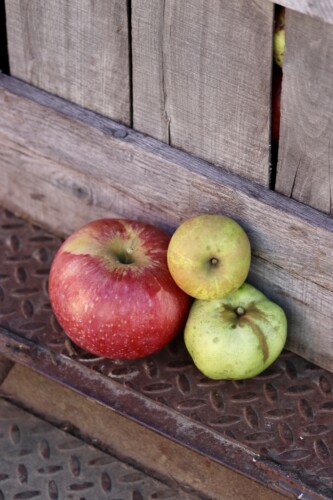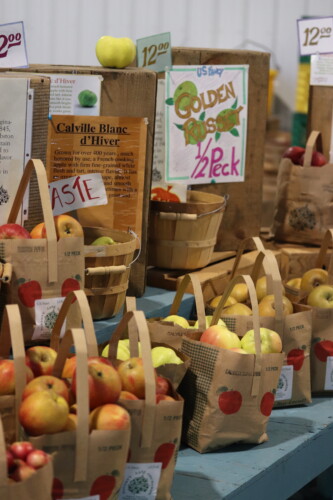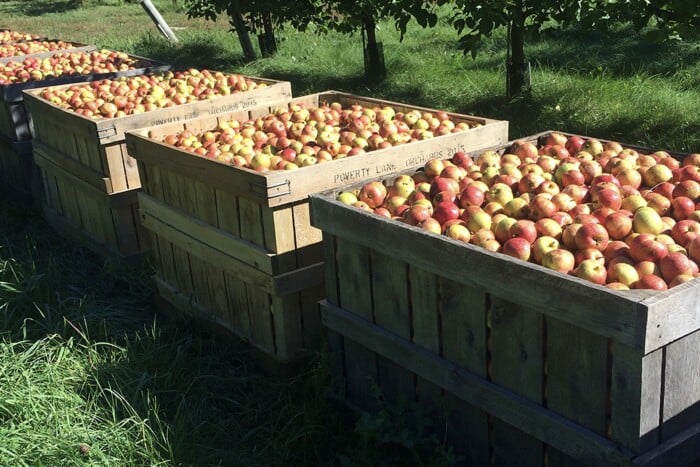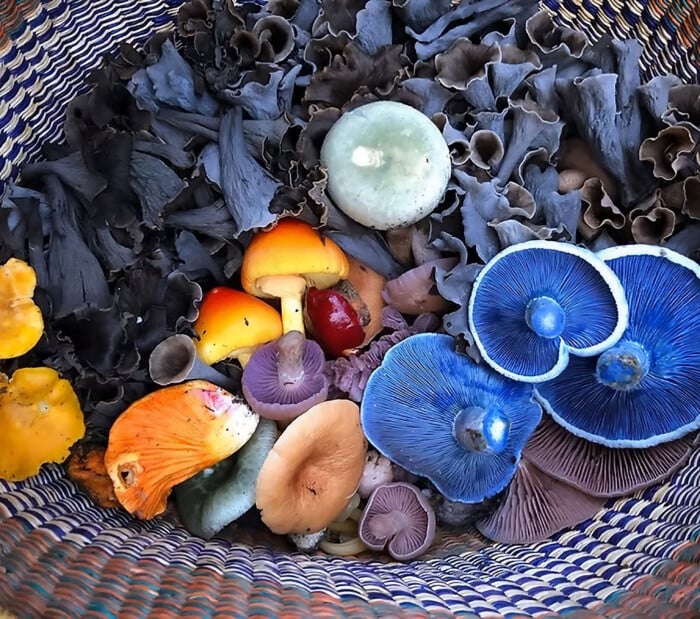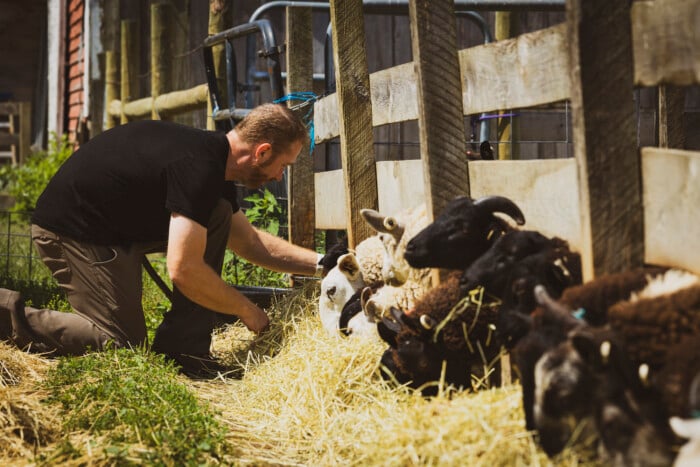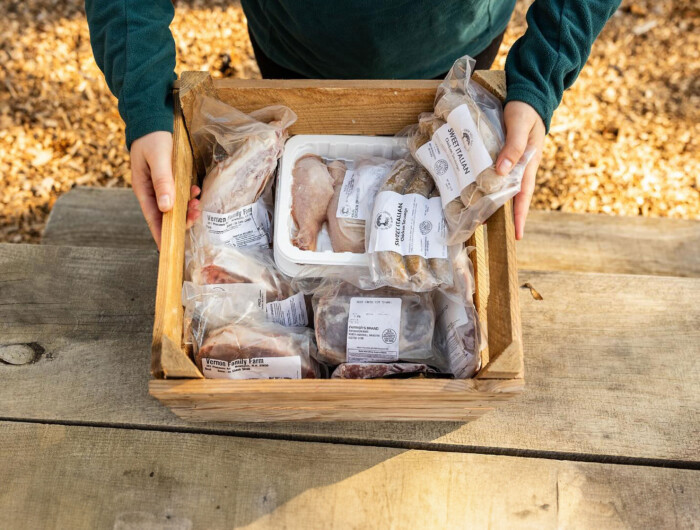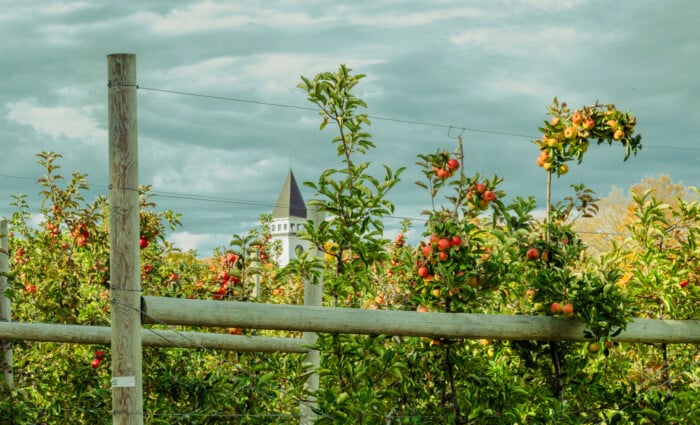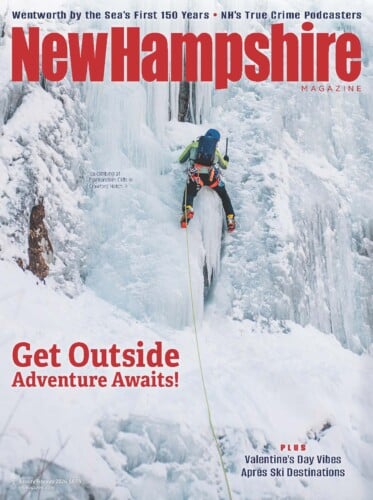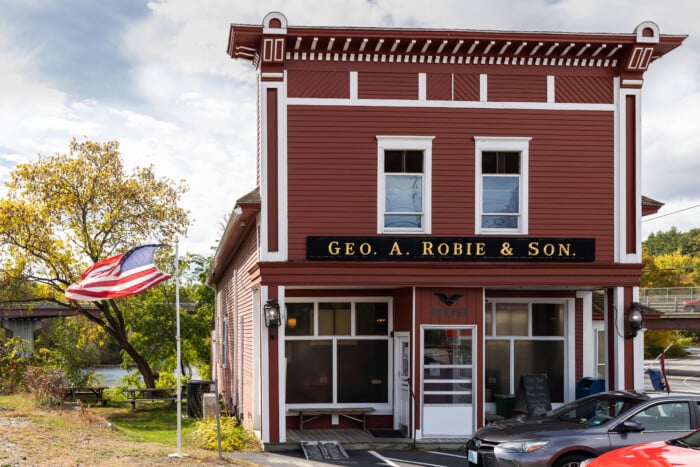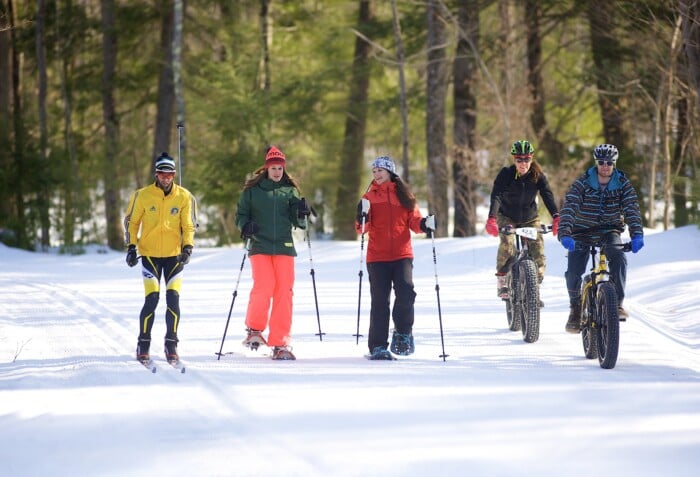Uncommon to the Core: NH’s Heirloom Apple Legacy
These farmers are working hard to preserve the rich and storied roots of New Hampshire's heirloom apple legacy
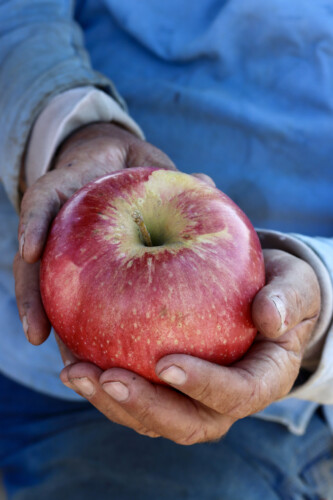
Chuck Souther nurtures the growth of uncommon apple varieties, including the colossal Wolf River, at Apple Hill Farm in Concord.
I’m driving the New Hampshire back roads on the kind of crisp, golden white-steepled day that makes out-of-towners swoon and flock to this state’s wealth of autumn festivals. Through afternoon light at every turn, white picket fences run alongside fading green fields. Wooden signs hang from posts that announce apple farms.
It’s festival season, a signature time in the Granite State, where on any given weekend one can pick your own at over 228 apple orchards and visit a multitude of fall celebrations, including the grande dame in Dover, Apple Harvest Day, a celebration that attracts more than 60,000 apple lovers.
But I’m craving something out of the ordinary, apples like the wobbly green reds from my youth, pulled from a tree with crumpled stems and tart-filled imperfect goodness. As a Midwestern transplant, I know in New Hampshire, I’ll find the apple heirloom, the apple uncommon.
Branch Hill Farm
Officially, Jared Kane is executive director of the Carl Siemon Family Charitable Trust (CSFCT), more commonly known as Branch Hill Farm: 4,200 acres of forest and fields nestled in Milton Mills. The farmhouse and barns sit among yellow and orange maples with a hand-painted sign announcing the harvest. This land embodies the vision of its founder Carl Siemon, who spent his summers baling hay on his grandparents’ 3-acre farm. Enthralled with the gentle beauty of the New Hampshire countryside, Siemon purchased the 1786 farmhouse for his six children and expanded his property holdings. In 1995, Siemon donated his acreage to protect the land and fulfill his wish “to keep New Hampshire New Hampshire.” Today, Branch Hill Farm promotes land conservation, education and stewardship. It’s open to the public for walks, for paddling and for learning about the magic embedded in pine forests, clear streams and yes, apple orchards. And that’s where Jared Kane comes in. Unofficially, Kane is an apple historian and apple aficionado — otherwise known as an apple geek.
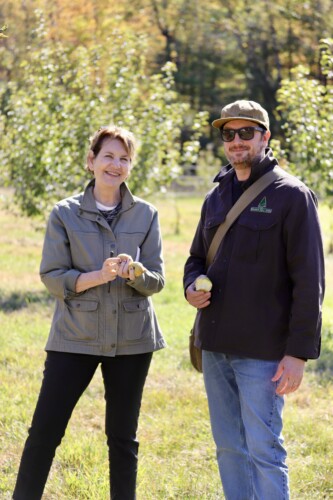
Chuck Souther nurtures the growth of uncommon apple varieties, including the colossal Wolf River, at Apple Hill Farm in Concord.
“It’s very simple for me,” Kane says. “If an apple tree is old and beautiful, I want to save it. They have stories to tell.” Spend time with Kane and it’s not possible to look at an apple in the same way. His apple journey began at the 10-acre home he and his wife purchased 12 years ago near Milton Mills. He was taken by the three old apple trees on his property, and dove into the history of apples. He learned about pruning, grafting and planting. “I was planting apple trees in every open spot, until my wife called and said, we’re done,” he says with a laugh.
Undeterred, Kane sought out Cynthia Wyatt, daughter of Carl Siemon and board chair at Branch Hill Farm. He asked if he might lease acreage from Branch Hill to grow more trees. Taken by Kane’s enthusiasm and depth of knowledge for all things apple, Wyatt offered Kane a staff position as executive director with the express task of planting a preservation orchard. Today, Branch Hill boasts a living museum and 4 acres of apple orchards with apple trees carefully chosen and nurtured by Kane. Their names read like a colonial monograph: Muscadet de Dieppe, Chisel Jersey, Bulmer’s Norman, Hewes Virginia Crab and Shire Everlasting (Milton Mills).
“Early farmers in New England brought over apple seeds from Europe, since apples were a huge part of their colonial economy,” Kane says. “The colonists didn’t trust the water because of rampant dysentery and typhoid fever. Alcohol kills bacteria, so the colonists (including their children) started to drink fermented apple cider that they made in their cellars.”
Not everyone knew how to graft, the process of rooting a tested variety onto established root stock to clone the graft and produce a reliable and uniform breed. Without grafting, rogue apple trees proliferated, most of the fruit destined for the feed trough or fermentation bin.
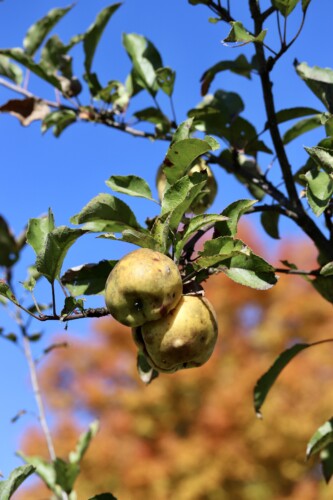
Imperfect dimples, golden hues and surprising taste sensations add character to the stories found in the heirloom varieties like this Chisel Jersey that are organically grown and treasured at Branch Hill.
Wildlings can still be found today. “Apple trees can grow to be 100 or even 200 years old. I even grafted 40 varieties on one tree! That’s what makes the process so exciting — you never know what you’re going to get,” Kane says. So-called seed sleuths throughout New England put up posters in villages in search of old trees and heirloom varieties. “The best time to look is in spring when the tree is flowering or in fall when there is fruit,” Kane says.
He splits open a tiny pinkish red apple and cradles it in his palm. “It’s amazing to think how this little fruit thrived here and still does, how it’s easy to take it for granted and how each of these apples holds a lasting legacy.” There’s an unmistakable reverence for the heritage in these heirloom trees that once stood in family orchards across the state.
Tracing apples’ roots is helped by the apple itself with names that suggest a place or a grower. The Roxbury Russet was a favorite among colonials in Boston. Then there’s the Spitzenburg, the Wickson, the Bramley and the Pippin. Dimpled and bruised, these imperfect apples offered early New England a reliable and pleasing taste in ciders, pies and straight off the branch. Bite into a Golden Russet and experience the buttery pleasure of silken cream. Add a Bramley to an apple pie with a dash of cinnamon and step back in time to the warmth of a colonial hearth.
The old trees offer a connect-the-dots puzzle for apple detectives like Kane. “There’s an unidentified variety in Maine we are provisionally calling ‘Late Duchess’ after the Duchess of Oldenburg. We can trace a line of identical trees from Maine into New Hampshire and put together stories of how people lived just by where we find the trees and fruit,” Kane says. It’s an apple culture that Branch Hill keeps alive and well in its preservation orchards, while a handful of New Hampshire and regional growers maintain the legacy of heirloom and uncommon apple treasures.
Apple Hill Farm
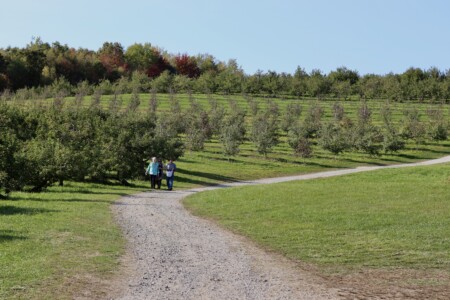
Visitors and apple geeks will find a treasure trove of heirloom and uncommon apples at Apple Hill Farm, the life work of growers Chuck and Diane Souther.
Tucked into the edge of Concord with views of the Sunapee Mountains, Apple Hill Farm bursts from the hills. Orchards unfold down the hillside in a success story written over four decades by owners Chuck and Diane Souther. Since high school, the couple have worked this land, creating their own lifework, both an art of sorts and a business. There is a bustling shop, pick-your-own patches and wagon rides, but walk into the orchards and it’s clear that here, apples are the heart of everything.
“Diane and I met in seventh grade. We were the only two kids who wanted to be farmers,” says Chuck Souther, a no-nonsense fruit grower with the kind of rugged hands that reveal his devotion to Concord and its land. “At our core, we are local growers and serve the local market.” With apples, “locally grown” at Apple Hill Farm means years of innovation to find the very best varieties for the New Hampshire climate and soil. Here you will find Cortland, Red Delicious and McIntosh. But climb the hill (taking a pause on an oh-so-carefully-placed bench to savor the view) and discover the Southers’ commitment to growing uncommon apples.
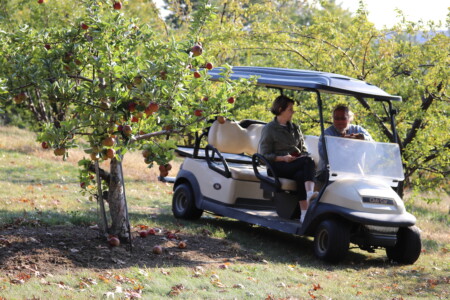
Chuck Souther offers writer Sands a tasting tour among trees exploding with luscious heirloom and uncommon apples like Wicksons and Baldwins.
Meet the Wicksons. Sprouting in bunches from every branch of a forest-green-leaved tree, in the uppermost row of the orchards, is a dazzler. The tree bursts with apples that resemble burgundy ornaments. Souther urges sampling. Bite into the thin skin to savor the juice and a lip-smacking tartness. “Acidic,” he says, never overly wordy about his apples, though he notes that these are perfect for cider-making. How have these apple wonders been hiding in plain sight?
Souther offers a clue: “With industrialization came the rise of large-scale commercial farming. The public wanted unblemished fruit.” It was a trend based on conformity and ease, and more about how fruit looks rather than subtlety of taste and intriguing qualities. The onset of supermarkets led to brands that are now household names: McIntosh, Fuji, Gala, Golden, Red Delicious and Granny Smith. And though other trees grow better-known varieties, the farm is known for nurturing and preserving the uncommon. “After the consolidation of grocery stores in the early ’90s, we started grafting trees to find alternate varieties. Every day was a discover your new apple.”
The result? A crop of grower-friendly and disease-resistant apples that you won’t find at your local grocer. For the apple geek, that means exquisite taste and a historic jaunt down the rabbit hole to find the stories inside the seeds. A popular variety from Colonia Americano, the Baldwins are a New England jewel with a light, crisp flavor. “They’re one of the hardest apples for packing, especially when packed and shipped in barrels,” Souther says. “In 1935, a horrific drop in temperature killed the Baldwins. They literally exploded.”
Given ever-changing climate conditions, growers like the Southers face an unending challenge to produce fruit in a northern region with winter freezing and summer heat. Still, with the Southers’ know-how and a certain steadfast determination embedded in the fruit, an heirloom legacy of apples prospers at Apple Hill Farm. There are apples the size of grapefruits (Tolson Sweet); with names like white wine (Calville Blanc d’hiver and Pomme Gris); for pies and cooking (Bramley); with sandpaper finishes (Ashmead’s Kernel); with tastes like triple crème cheese (Hudson Golden Gem); and simply fun with delicious names (Hubbardston Nonesuch, Blue Pearmain, Wolf River, Ragged Kearsarge). Wander through the heirloom orchards at Apple Hill Farm and bag apples with crumpled leaves hanging from the stems, the kind eaten as kids when each bite might turn up a worm. A little smaller than a volleyball, a bit bigger than a cherry, these are apples fragrant and earthy, something other than the usual, all of them grown right in New Hampshire.
Like her husband, Diane Souther is a no-nonsense grower who is not a stranger to hands-in-soil hard work. The baskets of apples in the farm shop are a sensation not only for their novelty, but also as a reflection of these growers’ stalwart commitment. Having tended the land with care — against enormous climate odds — they preserve a NH apple culture with roots in the colonial past. Souther buzzes through the shop and is eventually found among rows of blossoms in the farm’s luscious pick-your-own perennial beds. With all the farm offers its customers after so many decades, Diane Souther doesn’t hesitate when asked to name her favorite part after so many years. “The apples,” she says,
“It’s always the apples.”
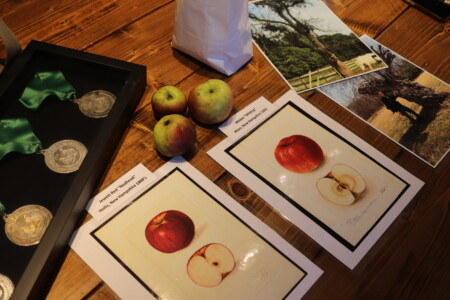
Apple preservationists like Jared Kane search for 100-year-old trees and discover New Hampshire’s apple legacy, a story that reflects award-winning cider and fruit grown on colonial farms.
Poverty Lane Orchards and Farnum Hill Ciders
Steve Wood and wife, Louisa Spencer, are an institution in apple-growing. As owners of Poverty Lane Orchards and Farnum Hill Ciders in Lebanon, Steve and Louisa are fondly referred to in the industry as the “Godparents” of the United States Cider Industry. Today, the orchards produce an assortment of heirloom and uncommon apples that are the foundation of Farnum Hill’s nationally recognized apple cider production.
Poverty Lane Orchards sits among rolling hills in the heart of the Connecticut River Valley, not far from the northern reaches of the Vermont border. Here you can grab a bag of Pippins, Spitzenburg, Calville blanc d’hiver or Wicksons, and the farm offers pick-your-own. But stepping onto the farm feels different from other pick-your-own adventures. Some orchards are lush with apple trees planted 60 years ago. It’s a landscape that gives a sense of something deeply rooted in its twisting, gray-barked trees, and in tractors, wooden shipping crates and metal storage tanks. In one of the outbuildings dedicated to cider production, there are temperature controls and gauges and Wood himself, a man who has thoroughly dedicated his life’s work to the land and apple trees. “I’ve never slowed down,” Wood says. “There are remarkable people involved in keeping these small farms afloat.”
His lifelong fascination with apples began at age 11 after his father, a family doctor, acquired a defunct dairy farm newly planted to apples. Eventually, he bought the orchards from his family. “In the ’70s and ’80s we grew McIntosh and Cortland and varieties that grow well in a cold climate. We hand-packed thin-skinned apples and shipped them out with other small and mid-size growers, like Chuck and Diane Souther,” he recalls.
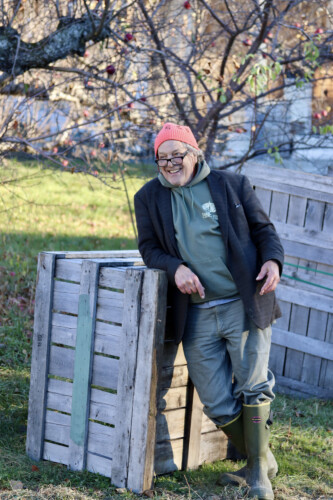
Steve Wood at Poverty Lane Orchards and Farnum Hill Ciders is a legend among apple growers and cider makers nationwide.
Faced with large-scale production in the ’80s, Wood needed to pivot. He researched “antique” apple varieties, and went abroad to learn about apples grown especially for “hard” cider. “We were doing grafting trials,” Wood says, “because these apples originated in different climates from New Hampshire’s, so we had to find varieties that would grow brilliantly here.”
Recognizing that small New England apple growers could not compete with massive orchards that he says, “disappeared over the curvature of the earth,” Wood set out to find profitable fruit. “We found some excellent varieties that grow to perfection on our land,” he says. Eventually, he and Louisa replaced their acres of McIntosh and Cortland trees and planted obscure varieties prized in former times. They planted fields of what they dubbed “Uncommon Apples,” and trademarked the name. By the early ’90’s, Wood says, “Our colleagues thought we were out of our minds.”
By the late 90’s, Wood and Spencer were growing the very best apples to make great fermented cider. They started Farnum Hill, and Wood spoke across the country to explain how to make “real cider” from vintage apples. “Early on, I went to a cider conference in Oregon, and there were 50 people,” says Wood. But they worked together with Chuck and Diane Souther and other New Hampshire apple growers to find a way for small farms to thrive.
Their success relied on an unflinching commitment to the land and the land’s bounty of specific apples adapted to growing conditions in New Hampshire. “It’s all about the land, what the land gives and what it can produce. We needed the right apples to make great cider,” Wood says. “It’s like wine — you can make something out of seedless grapes, but it won’t taste great.” Farnum Hill grew with a reputation for artisanal cider made through the time-honored legacy of growing regional apples to satisfy a local need. Sound colonial? Says Wood, “We love it, and we are very serious about it.”
By 2017, Farnum Hill became the model for growing specialized strange tasting cider apples. Meanwhile, the larger U.S. cider industry took off, with 70% to 80% growth from 2017 to 2018. There were 800 cider makers large and small at the cider conference in Chicago. However, orchard ciders were making their mark. “We grow the best apples available to make the finest bottle of cider,” Wood says. Meanwhile on the fresh fruit side, the market for historically-prized varieties is growing. As for uncommon apples, there’s the sheer delight of sampling the apples themselves. For example, you can taste Thomas Jefferson’s favorite apple, the Esopus Spitzenburg. “The market for specialty apples is small and privileged,” Wood says. “Most apple buyers settle for the familiar and don’t go out of their way to track down the uncommon varieties.”
A good cider apple is valued for high acid, high sugar and/or high tannin content. There are “bitter-sweets,” “bitter-sharps” and everything in between. Wood swears by the Golden Russet, a switch-hitter that works well for eating, cooking and also ferments well into cider. On the fresh side, pair a creamy brie and a Golden Russet with a light Chardonnay, and your taste buds will never be the same. Apples are the center of everything, but there’s a deeper thread among the preservationists and the growers.
For them, it’s all about the land. It’s a way to honor and maintain the historic legacy of superb fruit in all its imperfect glory to serve community. Wood doesn’t hide his unwavering affection for the growers and their work nurturing apple culture. “It’s hard to know what will happen to these small farms with climate change,” Wood says. “We protect the land and respect what it has always given back. I maybe care more about these apples and the trees than humans.”
